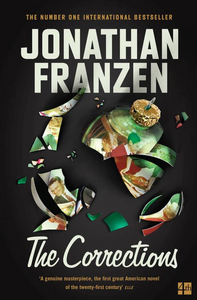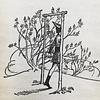You need to sign in or sign up before continuing.
Take a photo of a barcode or cover
adventurous
emotional
funny
hopeful
reflective
sad
fast-paced
Plot or Character Driven:
Character
Strong character development:
Yes
Loveable characters:
Yes
Diverse cast of characters:
Yes
Flaws of characters a main focus:
Yes
The Corrections by Jonathan Franzen is a masterful exploration of family dynamics, individuality, and the silent struggles that connect us all. Through the lives of the Lambert family, Franzen crafts a story rich with diverse perspectives, capturing each character’s unique path as they navigate life’s complications in isolation yet remain intrinsically bound by shared experiences. The novel’s depth and complexity reveal how deeply personal struggles intersect with broader societal pressures, offering a nuanced look at love, regret, and the relentless pursuit of personal fulfillment. Franzen’s vivid prose and sharp insights make The Corrections a deeply moving and timeless reflection on family and human connection.
emotional
reflective
slow-paced
Plot or Character Driven:
Character
Strong character development:
Yes
Loveable characters:
No
Diverse cast of characters:
No
Flaws of characters a main focus:
Yes
reflective
sad
slow-paced
Plot or Character Driven:
Character
Strong character development:
Yes
Loveable characters:
No
Diverse cast of characters:
No
Flaws of characters a main focus:
Yes
challenging
dark
reflective
slow-paced
My perverse little mind totally warmed to this book. Loved! Loved! Loved! I wish I could say the same for "Freedom", which against every dictum in my reading life, I DID NOT FINISH!!!!!
emotional
reflective
sad
slow-paced
Plot or Character Driven:
Character
Strong character development:
Yes
Loveable characters:
Complicated
Flaws of characters a main focus:
Yes
At times exhaustingly despairing, at times frustrating. A lot of ugly, mean people, to whom almost nothing good happens. A book in which almost every (white) American will see their own family refracted in places. At multiple times, made my heart heave with emotion, vow to be a better son, to call my mom, to be kinder to everyone.
challenging
dark
emotional
funny
slow-paced
Plot or Character Driven:
Character
Strong character development:
Yes
Loveable characters:
No
Diverse cast of characters:
Yes
Flaws of characters a main focus:
Yes
emotional
funny
reflective
medium-paced
Plot or Character Driven:
Character
Strong character development:
Yes
Loveable characters:
Complicated
Diverse cast of characters:
No
Flaws of characters a main focus:
Yes
Concussion Audio Book #1: The book that got me into Franzen, when I first read it back in 2015. I think what drew me back then, and what still holds sway upon re “reading” (listening), was how so Midwestern this book is, with the plot literally hinged on a mother’s wish to have everyone together for “one last Christmas.”
Other classic Midwestern plotlines: Alfred working his whole life for a railroad, going on Norwegian cruises, all the kids fleeing St. Jude, the fictional town where they were raised, an overblown significance attached to Christian holidays, entire scenes around long-distance phone calls and who’s paying for them.
Where Franzen loses me is his somewhat eccentric subplots, which he can’t seem to avoid (Purity seems like a novel incarnate of this weakness), and I could’ve done without the whole Chip doing underground work for a Lithuanian has-been of a politician, obsessed with shady schemes to bring the free market to Lithuania. The bit about investing in a drug that cures Parkinson’s, and using Alfred’s patent to do so, and also making Alfred a patient in testing the drug, is also a bit too whacky for my tastes.
But enough of that. Aside from that central plot point of bringing everyone home for Christmas, the novel is pure Franzian with in-depth characters, fascinating backstories, and the complex relationships that hold together or push apart this family, the Lamperts.
First, is Alfred, the head of the family, the lifelong railway worker, who retires just weeks too early, insists on being stubborn about patent rights, and finds solace in a giant, supportive blue chair in the sanctuary of the basement and the workshop. Alfred’s deteriorating health is the subject of much of the novel, and how his wife, Enid, is handling said deterioration, leaning on her children for support.
Second, is Enid, a classic grandmother, who is the friendlier of the bunch; whereas Alfred is grumpy, stubborn, and clueless, Enid can also be overworrying, a hindrance for her children, but ultimately means the best, even though her children don’t see it (and even question the severity of Alfred’s illness until they see it for themselves — Enid alas gets the short end of the stick in this familial dynamic).
Then we have the three children, the most fascinating part of the book:
Chip is a thirty-something professor at a small liberal arts college in a New England state, whose defined by his pretentiousness, followed by an intense sexual and drug-ridden encounter with one of his students, which quickly takes a turn for the worse, leading to some grade-A creepy behavior and his dismissal from the university and his exile to NYC where he becomes a “screenwriter.”
Chip is a bit of the fuck-up here, the most selfish, and the least put together — though his plotline is perhaps the most interesting, with me constantly looking forward for the text to return to his story (which ultimately means the holes he ends up digging himself in). The title of the book first appears here, where he races across town, skipping lunch with his parents and sister, to make corrections on his screenplay before a big shot producer reads it.
Denise is the youngest child, a daughter, is the most pulled together on the surface, until she isn’t. She’s an accomplished chef in Philadelphia, bankrolled by a man who made his fortune selling IP to the illusive and very capitalistic W company, before sleeping with both the man and his wife, correcting herself (finding herself?) to do so, and then sealing her firing when the man finds out about it.
The big turn of the book (and also the most tear jerking) is the moment Denise realizes Alfred retired early so as to avoid a story coming out about Denise sleeping with one of Alfred’s coworkers, when she was still a teenager in St. Jude.
And then Gary, the oldest, whose relationship with his wife and three sons are average at best, as his relationship with alcohol. Gary is the bossy one of the group, also super type-A, feeling that he knows what’s best for everyone and letting his family, particularly Enid, hear it. Gary’s the typical middle-class American story, strung out and at wit’s end like a John Updike character.
For all the characters’ flaws though, they really are lovable in their own ways. Gary is trying to balance the responsibilities at home with those in St. Jude, and the way he encourages Jonah to go to see his grandmother is really redeeming; Denise pulls herself together because she has to, despite her dreams crumbling around her; and Chip… well, Chip is sort of a black sheep. He’s what every twenty-year old at a liberal arts college aspires to be, but shows the follies and instability of such a lifestyle.
Together, they make an imperfect but inherently American family, with love weaving its way through the dynamic, and people correcting themselves to make it so, even if it has to get through some arrogance, stubbornness, and selfishness that is also part of any family.
Other classic Midwestern plotlines: Alfred working his whole life for a railroad, going on Norwegian cruises, all the kids fleeing St. Jude, the fictional town where they were raised, an overblown significance attached to Christian holidays, entire scenes around long-distance phone calls and who’s paying for them.
Where Franzen loses me is his somewhat eccentric subplots, which he can’t seem to avoid (Purity seems like a novel incarnate of this weakness), and I could’ve done without the whole Chip doing underground work for a Lithuanian has-been of a politician, obsessed with shady schemes to bring the free market to Lithuania. The bit about investing in a drug that cures Parkinson’s, and using Alfred’s patent to do so, and also making Alfred a patient in testing the drug, is also a bit too whacky for my tastes.
But enough of that. Aside from that central plot point of bringing everyone home for Christmas, the novel is pure Franzian with in-depth characters, fascinating backstories, and the complex relationships that hold together or push apart this family, the Lamperts.
First, is Alfred, the head of the family, the lifelong railway worker, who retires just weeks too early, insists on being stubborn about patent rights, and finds solace in a giant, supportive blue chair in the sanctuary of the basement and the workshop. Alfred’s deteriorating health is the subject of much of the novel, and how his wife, Enid, is handling said deterioration, leaning on her children for support.
Second, is Enid, a classic grandmother, who is the friendlier of the bunch; whereas Alfred is grumpy, stubborn, and clueless, Enid can also be overworrying, a hindrance for her children, but ultimately means the best, even though her children don’t see it (and even question the severity of Alfred’s illness until they see it for themselves — Enid alas gets the short end of the stick in this familial dynamic).
Then we have the three children, the most fascinating part of the book:
Chip is a thirty-something professor at a small liberal arts college in a New England state, whose defined by his pretentiousness, followed by an intense sexual and drug-ridden encounter with one of his students, which quickly takes a turn for the worse, leading to some grade-A creepy behavior and his dismissal from the university and his exile to NYC where he becomes a “screenwriter.”
Chip is a bit of the fuck-up here, the most selfish, and the least put together — though his plotline is perhaps the most interesting, with me constantly looking forward for the text to return to his story (which ultimately means the holes he ends up digging himself in). The title of the book first appears here, where he races across town, skipping lunch with his parents and sister, to make corrections on his screenplay before a big shot producer reads it.
Denise is the youngest child, a daughter, is the most pulled together on the surface, until she isn’t. She’s an accomplished chef in Philadelphia, bankrolled by a man who made his fortune selling IP to the illusive and very capitalistic W company, before sleeping with both the man and his wife, correcting herself (finding herself?) to do so, and then sealing her firing when the man finds out about it.
The big turn of the book (and also the most tear jerking) is the moment Denise realizes Alfred retired early so as to avoid a story coming out about Denise sleeping with one of Alfred’s coworkers, when she was still a teenager in St. Jude.
And then Gary, the oldest, whose relationship with his wife and three sons are average at best, as his relationship with alcohol. Gary is the bossy one of the group, also super type-A, feeling that he knows what’s best for everyone and letting his family, particularly Enid, hear it. Gary’s the typical middle-class American story, strung out and at wit’s end like a John Updike character.
For all the characters’ flaws though, they really are lovable in their own ways. Gary is trying to balance the responsibilities at home with those in St. Jude, and the way he encourages Jonah to go to see his grandmother is really redeeming; Denise pulls herself together because she has to, despite her dreams crumbling around her; and Chip… well, Chip is sort of a black sheep. He’s what every twenty-year old at a liberal arts college aspires to be, but shows the follies and instability of such a lifestyle.
Together, they make an imperfect but inherently American family, with love weaving its way through the dynamic, and people correcting themselves to make it so, even if it has to get through some arrogance, stubbornness, and selfishness that is also part of any family.



